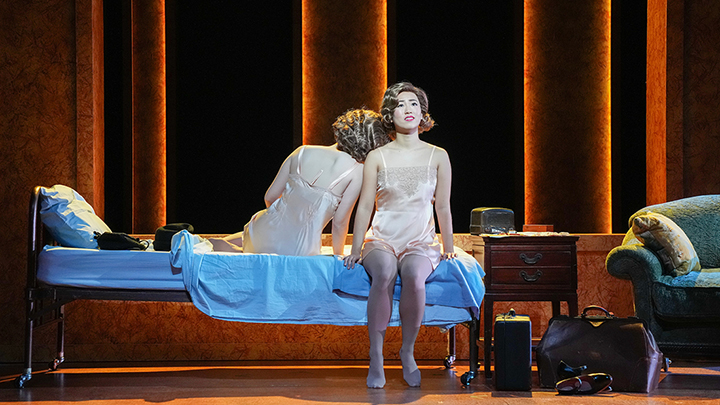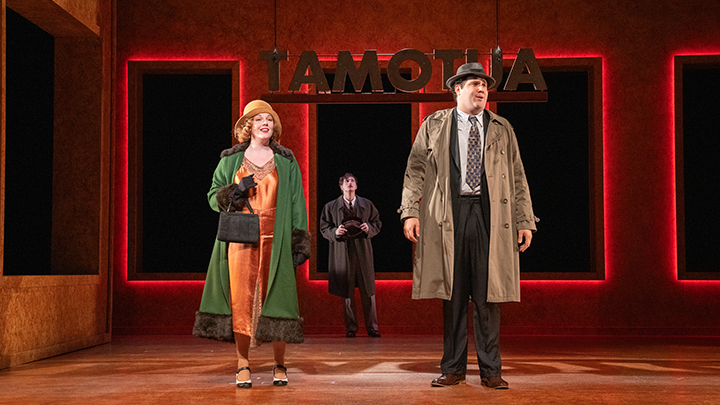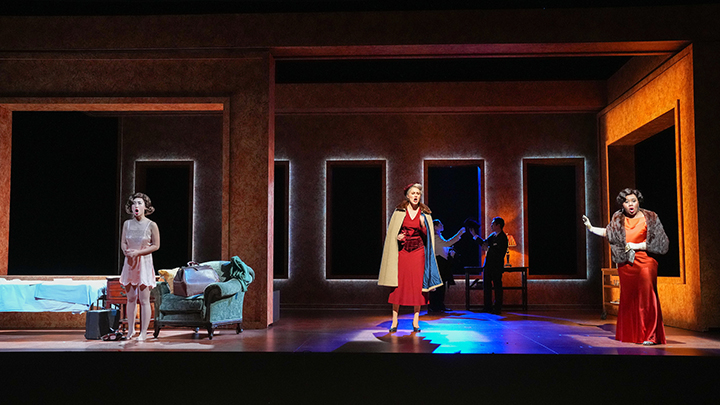
Even when his subjects are not looking through them, windows are almost always present; sometimes dark portals into the night, sometimes frames through which we view his subjects, or through which they gaze out into the world.
Hopper’s windows and the solitary people we see within them became the inspiration from John Musto and Mark Campbell’s Later the Same Evening, a one act opera that takes inspiration from five of Hopper’s paintings and envisions a large cast of variously isolated New Yorkers (and tourists) who meet briefly at the theater. Presented by Juilliard Opera this week, Musto and Campell’s opera, which premiered in 2008 at the Manhattan School of Music, is a near-perfect student opera—a true ensemble piece that gives every actor a moment or two to shine, complex without being overly difficult, and balancing humor and self-reflection. It works well for this particular context, in other words, but is perhaps nothing special otherwise, though it deserves praise for its clever concept and economical introduction to eleven named characters.
While it is largely a charming work, Musto’s opera begins with a few missteps: first by presenting a portrait of an unhappy marriage that is anything but unique: Gus and Elaine chatter right past each other, talking without saying anything and feeling themselves both misunderstood by the other. You’ve seen this portrait of straight marriage too many times to find it interesting, and the superficiality of the wife’s character felt like a misreading of Hopper’s painting. 1932’s Room in New York could just as easily be read as companionable silence, the intimacy of parallel recreation. Similarly, the next character, a widow waiting for a date in reference to 1955’s Hotel Window, has none of the intensity and focus of Hopper’s subject who gazes intensely out the window. Instead, Estelle Oglethorpe is a fretful woman, interrupting herself constantly, in a manner both too similar to the chatterboxes of the previous scene and without the ambiguity and opacity that lurk in Hopper’s works.
All of the characters meet at the theater, to see a Broadway show called Call Me Tomorrow! starring the latest hit star, Gloria Devere. A lengthy scene sees the actors as audience members, reacting to the invisible production while Musto’s music becomes a humorous pastiche of contemporary and Broadway influences. Musto’s score—briskly conducted by Joseph Colaneri— has a propulsive, minimalist-inflected, drive, its anxiety punctuated by tender lyricism. At times it grates, as in the overlong “Rain” octet (“Rain! Water falling from the sky”), but more often it pleases, if never pulling me from my seat.
But as the opera wears on, it becomes more complex and more touching Musto’s final scene, with Thelma the usher and the jilted lover Joe, is based on 1927’s Automat—with its reflected lights and yellow-hatted woman— and is the finest in the show. The beleaguered theater usher stops for a late-night coffee to rest her tired feet at an Automat. She muses about her job, which is simply alright for now, before turning her thoughts to New York and loneliness. Here Campbell and Musto finally strike the perfect balance; Thelma is no-nonsense, at once a bit jaded and a bit of a romantic. Thelma concludes that New York is a beautiful place to be alone, one where loneliness can also be full of possibility—perhaps the possibility of connection, perhaps just the pleasure of being alone with your thoughts in a city full of strangers.
Alison Moritz’s stylish direction smoothly recreated some of Hopper’s vignettes (helped by Lawrence E. Moten III’s effective scenic design) without ever feeling too self-satisfied about these moments, and in her major stroke, introduced silent doppelgängers as scene partners for a few of the arias, the doubles’ features made hazy by sheer, flesh-colored masks. These moments strikingly captured the self-alienation that at times creeps into Hopper’s paintings, the feeling of being both alone and watched or of catching a startling glimpse at yourself in a black, shiny window. Working as she was with Mark Campbell’s somewhat uneven and occasionally banal libretto, her more suggestive and surreal directorial choices didn’t always have enough room to breathe; the doubles were more interesting than some of their characters, and the quick shifts between humor, realism, and melodrama made Moritz’s job more difficult than it needed to be, particularly in the ensemble scenes.
Her cast performed admirably, nonetheless. Standouts included soprano Gemma Nha as Ruth, a down-on-her-luck actress who decides to leave the city, whose focused and luminous sound made her aria a dramatic and vocal high point. As the two halves of bickering couple Sheldon and Rose Segal, Samuel Rosner and Jasmin Ward were refreshingly funny and had the most palpable chemistry of any of the lead pairs, crafting an elderly pair whose fighting conceals real enjoyment of one another’s company.
Song Hee Lee, whose compact, gleaming soprano brought both humor and edge to her role as an utterly exasperated Italian tourist (though I doubt a such a stereotypical Italian would be quite so annoyed about a ten-minute delayed start) called Valentina Scarcella. Colin Aikins’s irrepressible physical enthusiasm as delighted tourist Jimmy O’Keefe nearly overwhelmed his soft, cloudy tenor, but he progressively focused his sound into a place of greater presence and richness, revealing a genial voice to match his character. As the Portuguese Ronaldo Cabral, baritone Minki Hong, was especially charming, however, as an unabashedly corny suitor to Lucy Joy Altus’s hesitant and anxious widow Estelle Oglethorpe.
While their scenes were often my least favorite dramatically, soprano Jazmine Saunders’s natural charm and balmy, inviting sound brought welcome depth to her character, Elaine O’Neill, the neglected wife of an ad-man who hopes that a night at the theater may bring her closer to her husband (or perhaps give her permission to leave him). Her fear that their estrangement is permanent is one of the stronger dramatic threads. Jared Werlein’s expressive bass-baritone—which sounded both sturdy and vulnerable— made for a surprisingly poignant take on the checked-out husband trope as Gus O’Neill. This unexpected sweetness yielded satisfying dramatic returns at the end of the show, when Gus drunkenly realizes that he should cut back on work and make an effort to enjoy his wife.
Lizzy Hayes, as the usher Thelma, felt and sounded perfectly at home in Musto’s idiom and in their character, while Trevor Haumschilt-Rocha brought a perfectly balanced baritone, warm and clear like amber, to Thelma’s eventual companion, the jilted lover Joe. It ends abruptly, with Thelma and Joe walking off into the New York Night, neither fully alone nor fully together.
Photos: Richard Termine





























Comments